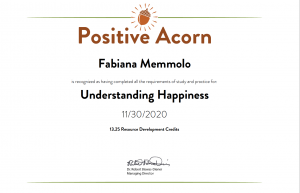Some months ago, I attended a course designed and created by Dr. Robert Biswas-Diener, one of the world’s foremost authority on positive psychology coaching. The theme of the course was happiness and discussed a wide range of theories and research results from the study of happiness.
Dr. Biswas-Diener argues that happiness is a process not a destination, basically happiness fluctuates between moments of ups and down. Happiness is multi-faceted and includes different subjective cognitive, behavioral, and emotional components. It is experienced within and people have their judgmental criteria to establish their level of happiness. The individual knows to what extent they are happy. Personal values, beliefs and aptitude to prioritize what really matters to them are the criteria used to judge the level of happiness. Beyond every definition, happiness is what makes you feel good and satisfied with who you are and what you have. The common belief is to see the correlation between material objects and happiness. Most people think the more they have the happier they are.

Is it really possible to quantify happiness based on material possessions?
Scientific research has shown that people think that more money will make their life happier and improve their quality of life. For that reason, they value a good job, high income, and expensive possessions as the most important goals to reach during their life. Someone might consider the acquisition of goods and money an important achievement that reflects one’s culture, and experience pleasant emotions when they are successful at this. Money is a fundamental aspect of human life throughout different cultures and societies, since people spend a large amount of their time earning and spending money. The process of earning and spending money produces short-term spikes in positive feelings, but it does not enhance one‘s long-term levels of well-being. Further, societal pressure influences people to gain more money, to have more material possessions such as cars and houses that become a symbol of gained status and good standing in the community, and to not be perceived as failures.
What are the effects of income on happiness?
People tend to evaluate the necessary salary according to the previous one, this means that if you earn 30k you think that to be happy you have to earn 50k. And so on, if you have arrived at 100k, you are thinking that what you really need is 250k. This is a psychological and mental process that constantly pushes you to believe that you need more to be happy. Fundamentally, people are never satisfied with what they have and, look around them to compare their lives with others. Certainly, the perfect income, lifestyle or a guaranteed way to reach happiness does not exist. In his research Dr Diener highlights that a higher income might help if someone is very poor and living in a wealthy society has beneficial aspects. On the other hand, continuously wanting more money may reduce the possibility of enhancing one’s happiness.
After a certain period, people get accustomed to these material possessions and do not feel the same satisfaction anymore from what they have, so the mind sets new and higher expectations. This seemingly endless process does not make them happy. Therefore, for most people happiness is doing something that they love, that gives a sense and purpose to their lives, and they can express their talents and deep passions. Focusing exclusively on the acquisition of material wealth can decrease happiness, and increased income has risks as well as pleasures. It might be useful to give more attention to your needs and desires that can make you feel fulfilled and benefit your environment.
“Happiness is not something ready made. It comes from your own actions.” ―








